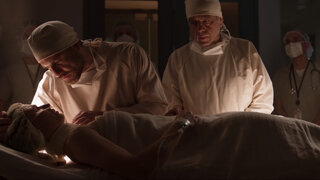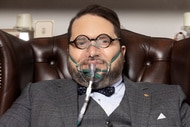Create a free profile to get unlimited access to exclusive videos, breaking news, sweepstakes, and more!
Understanding Dr. Death Paolo Macchiarini's Rise and Fall as Superstar Surgeon
It would take a scorned lover, skeptical colleagues and investigative journalist to bring this successful surgeon down.
For a time, Paolo Macchiarini was a superstar in the scientific community.
As the world’s first doctor to perform a synthetic organ transplant, the thoracic surgeon appeared to be paving the path toward a new and promising future that would transform the lives of patients and forever alter the transplant world.
In one patient after another, Macchiarini surgically installed an artificial plastic trachea coated in the patient’s own stem cells, as he touted his success and publicly boasted of the patients’ improved lives.
But within a few years, that promise had been extinguished. Most of Macchiarini’s patients had died and new questions emerged about his background, methods and seemingly reckless behavior. A criminal investigation was even launched into his actions.
Just what led to the surgeon’s sudden downfall? Macchiarini was brought down by criticism from fellow researchers at the Karolinska Institute, a scathing television documentary and even his own scorned lover, Benita Alexander — who exposed the countless lies he fed her during their relationship in a 2016 Vanity Fair article.
RELATED: A Timeline of Paolo Macchiarini's Relationship with Benita Alexander
His story — and passionate and ill-fated romance with Alexander — is the focus of Season 2 of Dr. Death, starring Edgar Ramirez and Mandy Moore, now streaming on Peacock.
Paolo Macchiarini Receives International Acclaim
Macchiarini was the subject of international headlines in 2011 when he became the first surgeon to perform a synthetic organ transplant by installing an artificial trachea into 36-year-old Andemariam Beyene at the prestigious Karolinska Institute, the same institution that decides who receives the Nobel Prize in Medicine each year, according to BBC.
Macchiarini and his colleagues touted the procedure’s success in The Lancet later that year, writing that Beyene was growing new tissue and had an “almost normal airway.”
Building on that success, Macchiarini went on to perform two more artificial trachea transplants at the Karolinska Institute and performed other procedures at a clinic in Russia and the United States.
In June 2014, the NBC News special “A Leap of Faith” highlighted the ground-breaking work. It was during the filming of this special that Alexander, a then-producer for NBC, fell in love with the charismatic surgeon.
How were Paolo Macchiarini’s deceptions exposed?
Macchiarini appeared to be on the top of the world, but that same month, questions began to emerge about his work. A Belgian researcher submitted a report to the Karolinska Institute accusing him of scientific misconduct, according to the institution.
Months later, four doctors from the Karolinska University Hospital also filed two separate reports questioning the results of his scientific papers and suggesting his reporting on patient outcomes was inaccurate. By then, nearly all of the patients who had undergone the artificial transplant had died. An autopsy of Beyene showed his synthetic trachea had come loose as he battled repeated infections.
“If I had the option of a synthetic trachea or a firing squad, I’d choose the last option because it would be the least painful form of execution,” Pierre Delaere, a professor of respiratory surgery at KU Leuven would later say in the documentary Experimenten of the pain patients suffered, according to The Guardian.
An outside expert, Dr. Bengt Gerdin from Uppsala University Hospital, was called in to investigate the claims made by the researchers and concluded in May of 2015 that Macchiarini had been guilty of scientific misconduct.
But the KI’s Vice Chancellor Dr. Anders Hamsten later threw out the report and Macchiarini’s contract was extended at the center, according to the BBC. Per the KI timeline, his position as a visiting professor was terminated, but his contract as a researcher was extended through November 30, 2015.
It wasn’t until early 2016 that Macchiarini’s outlandish lies in his personal life were exposed by Vanity Fair that backlash against the surgeon would reach a fever pitch.
Alexander described in the article how Macchiarini had won her heart, proposed marriage and claimed to be planning an elaborate Italian wedding that would be officiated by Pope Francis. Just months before the nuptials, however, Alexander discovered that Macchiarini was still married to his wife of nearly 30 years and the wedding had been an elaborate hoax orchestrated by Macchiarini.
A spokesman for Pope Francis would insist he never knew anyone named Macchiarini and never promised to officiate his wedding.
Vanity Fair also looked into Macchiarini’s credentials and exposed lies on his resume. For example, Macchiarini claimed to have completed a two-year fellowship in thoracic surgery at the University of Alabama at Birmingham, but the school showed no record of that.
Then just weeks later, a Swedish documentary series called Experimenten (The Experiments), led by journalist Bosse Lindquist, took aim at Macchiarini’s surgical claims and raised disturbing ethical questions about his research.
RELATED: Mandy Moore Is Charmed by Edgar Ramirez's Dr. Death in Sneak Peek
Despite Macchiarini’s published claims in The Lancet that Beyene had an “almost normal airway,” bronchoscopy footage taken after the surgery showed he had a build-up of scar tissue and a fistula, or hole, in the artificial trachea, according to the BBC.
Lindquist questioned why the procedures were done on humans before any research was published on the impact the artificial tracheas had on animals, implying that the implying that the tracheal surgeries performed on humans were experimental.
"We didn't do any animal study that involves large animals — of course not, we didn't have the time,” Macchiarini responded in the documentary. “The material was proven, the material was studied. We used fibres that were approved by the FDA [the US Food and Drug Administration]. And now all the studies are coming."
Delaere contended that the very idea that a synthetic trachea could establish a new blood supply was “one of the biggest lies in medical history” and was “impossible from a theoretical point of view,” BBC reported.
What happened to Paolo Macchiarini?
Macchiarini’s swift downfall also brought down key leadership within the Karolinska Institute, including Hamsten, who resigned during the scandal, according to The Guardian.
As for Macchiarini himself, the Karolinska Institute reversed their earlier decision and found him guilty of scientific misconduct, ABC News reported. The six papers he wrote on the transplant surgery were also retracted.
At the same time, Swedish prosecutors began to look into the brazen doctor’s actions and announced in September of 2020 that Macchiarini was being charged with aggravated assault in connection with the three surgeries he performed at the Karolinska Institute.
In June of 2023, he was found guilty of gross assault of the three patients and sentenced to two-and-a-half years in prison by an appellate court, according to Science Magazine.
The appellate judges concluded that Macchiarini “acted with criminal intent.”
Viveka Lång, one of the appellate judges who ruled on the case, said they believed Macchiarini was aware “of the risk that the procedures would cause the patients physical injuries and suffering and that he was indifferent to the realization of the risks,” the magazine reported.
His story — and passionate and ill-fated romance with Alexander — is the focus of Season 2 of Dr. Death, starring Edgar Ramirez and Mandy Moore, now available on Peacock.
































